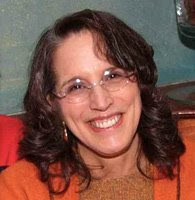Deborah was a brand new graduate with her MLS from Queens College in the early seventy's. There were no library jobs then. So she became a claims representative at Social Security for 15 years. She learned medical terminology and all about disability claims.
Then she worked for a director of an advertising agency as a solo librarian locating art work. This experience exposed her to a lot of things that people do in libraries.
Deborah spoke of the Information Sourcerer. This was a project of the National Medical Library during the 1990s. It was a part of the Unified Medical Language System (UMLS) project. "There are four UMLS Knowledge Sources: the Metathesaurus®:, the SPECIALISTtm Lexicon, a Semantic Network and an Information Sources Map" (Introduction, ¶3). The Information Sourcerer was the query interface for the Information Sources Map (ISM).
The U.S. National Library of Medicine's (NLM) Sourcerer project is developing software which accepts a user query, automatically identifies appropriate information resources, and facilitates connection to those sources for information retrieval. The current Sourcerer prototype utilizes the multimedia/multiplatform/multiprotocol network-based hypertext system known as World Wide Web. It also relies upon the knowledge sources of the Unified Medical Language System (UMLS). The UMLS is the result of a long-term project of NLM. It comprises a large Metathesaurus of biomedical concepts (coupled with a semantic network and syntactical/lexical software tools) and the information Sources Map (ISM), a database of records describing specific biomedical information resources. (Rogers, 1995 in UMLS, Access to Multiple Knowledge-based Information Sources, 1986-1996, ¶12).
Deborah then talked about the American Association of Information Professionals and the Special Libraries Association. An extensive list of Competencies for Information Professionals has been developed (in pdf format, 17 pages).
Mary Ellen Bates (photo) (her blog) created the profession of Independent Information Professionals. She is a pro in online searching. Deborah also spoke of Tom Rink as a solo librarian with the police department.
Deborah explained that doing archiving requires common sense, asking questions, being able to organize, and being prepared for the unexpected. Archiving has its share of drudge work as well as making judgments.
I asked Deborah if she had ever heard of Jennifer John who had been the only research librarian at the Houston Public Library. Jennifer's twin brothers (Peter and John) were the age of one of my younger brothers, so I had known of her through my school years in Houston. I saw her parents regularly when I was sailing at the Houston Yacht Club. They told me she had just started a business as a research librarian. It sounded so interesting that I paid Jennifer a visit.
She had a staff of about 12 or 15 young people all wearing the black T-shirt of her new private reference service. She had trained them in the use of the computer and searching databases. She had a wonderful brochure and information about her business, which I probably still have filed away in some very old papers. She said she got lots of referrals from the Houston Public Library since they had not replaced her and there was no one else to do reference work.
It was the Summer of 1981, when I left Houston to live in New York City. I have lost touch with Jennifer since, but I will always remember her concept of the business. I remember thinking that I wish I had access to all those databases she taught her people to use. I now realize that Jennifer was also a Independent Information Professional.

No comments:
Post a Comment